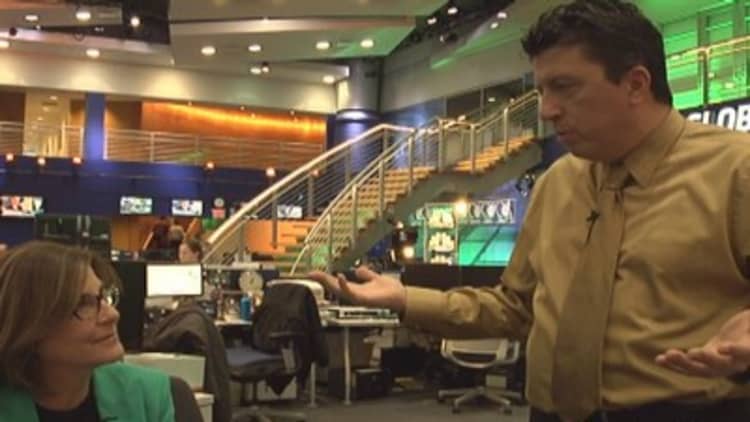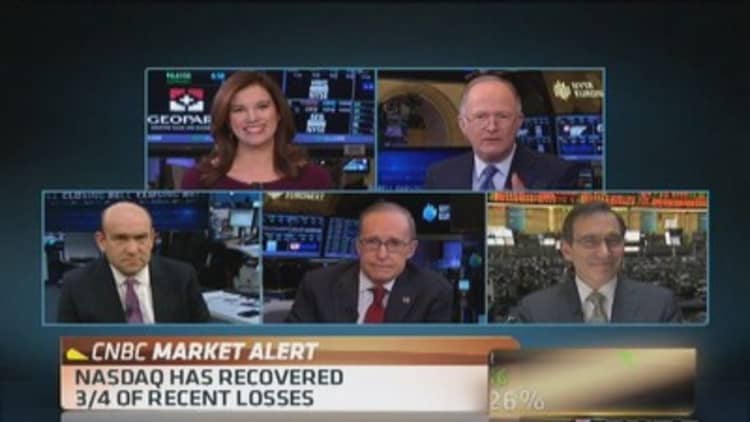
In her first congressional testimony as Fed chair, Janet Yellen on Tuesday reassured markets that she is just as dovish as her predecessor and that the central bank will not be quick to pull away from stimulus.
Her comments sparked a sharp jump in stocks and fired up a rally that continued into the afternoon session. The Dow was up more than 1 percent at 15,985, and the Nasdaq hit a new high for the year, rising nearly 1 percent. The S&P 500 also was up nearly 1 percent, breaking key technical levels of 1,800 and 1,810.
The 10-year Treasury traded lower, and its yield rose slightly to 2.72 percent.
"I think it's similar to Ben Bernanke's last press conference in that she's upbeat on the economy, so the reason for tapering are that the economy's is ready for it," said Ward McCarthy, chief financial economist at Jefferies. "As far as the stock market is concerned, it's pretty optimistic. She still was reluctant to put a time frame on when the Fed might raise rates."
Yellen takes the helm as the Fed moves away from its extraordinary and controversial quantitative easing program, implemented to help keep interest rates low and drive up asset prices. The new chair defended QE but made clear that the Fed was on track to continue tapering and end the $65 billion in monthly purchases.
"What would cause the committee to consider a pause [in tapering] is a notable change in the outlook," she told the House Financial Services Committee.
"I think quantitative easing, or purchases of securities, did serve to push down mortgage rates and long-term interest rates quite substantially," said Yellen, adding that the lower rates helped the housing recovery.
(Read more: Yellen just added pressure on emerging markets)
Meanwhile, the bond market's reaction to Yellen was muted. There was not much of an impact on Treasurys, which were bracing for a 10- and 30-year bond auction Wednesday and Thursday, said David Ader, chief Treasury strategist at CRT Capital.
"I would certainly say there's very little in any of the dovish takeaway to say we improved 4 basis points," he said. "I think the market got this joke. ... In that regard, the bond market is always one step ahead."
Separate from the QE program is the Fed's emphasis on keeping short-term rates low for a long time—an area where the markets are looking for more information from the Fed.
Joseph LaVorgna, Deutsche Bank's chief U.S. economist, said Yellen's most interesting comments were about this forward guidance. The Fed has said it would consider 6.5 percent unemployment or a 2 percent inflation rate thresholds, not triggers, to consider raising short-term rates.

Yellen said crossing one of the thresholds would not automatically prompt the Fed to raise the fed funds rate but to consider whether the economic outlook justified doing so.
"In other words, it is not either threshold that needs to be breached but rather both," LaVorgna said in a note. "This partially deals with the clumsy wording of the thresholds in the FOMC statement without pushing policymakers to actually lower the unemployment rate threshold. However, at some point, we look for Fed policymakers to 'clean up' the current statement."
Traders view the jobs report as the single most important data point for the Fed's decision process, though Yellen said the Fed also looks at consumption data and other factors.
She did not mention the weak January and December jobs reports until she was asked about them.
"She didn't seem to be worried about it at all," said Peter Boockvar, chief market analyst at Lindsey Group. "If she was, she would have included it in her statement."
Yellen did caution that it is too soon to reach a conclusion on the sluggish jobs report and that weather could be a factor.
January's nonfarm payrolls totaled 113,000, while the unemployment rate fell to 6.6 percent from 6.7 percent. That compares with an even softer report for December, when just 75,000 jobs were created. Economists had expected 185,000 nonfarm payrolls in January and an unchanged unemployment rate of 6.7 percent, according to Thomson Reuters.
Economists look for the unusually harsh winter weather, with below-normal temperatures and intense snow and ice storms, to affect the economy slightly.
Yellen's tone was dovish, Boockvar said.
"Even though she wants to taper and she created a certain hurdle for it, there's a dovishness around her demeanor. If things changed, she would stop."
(Read more: Markets fear U.S. chilled by more than weather)
The dollar rose against the yen as Yellen spoke, signaling to traders that the market in a "risk on" mode.


